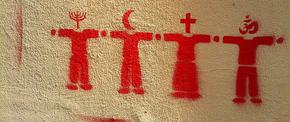The views expressed in our content reflect individual perspectives and do not represent the authoritative views of the Baha'i Faith.
When I began an online correspondence with a Jehovah’s Witness who signed himself “Epignosis” (toward knowledge), he did not so much ask questions as issue challenges he wanted me to respond to.
Our dialogue started at the point where my friend had already read a bit about the Baha’i Faith in the apologetic materials of the Watchtower Society, the Jehovah’s Witness administrative corporation. (Apologetics are materials meant to defend a particular religious view.) So, he knew where he wanted to begin the discussion.
Epi’s first challenge against the Baha’i concept of the unity of God and religion went like this: if there are different religions, it follows that they must come from different gods.
He stated his argument as: God is not divided with Himself. There is one God, one faith. What would be the point of having all sorts of religions saying different things?
I couldn’t agree more, I told him.
RELATED: The World’s Religions: All Branches of One Tree
Jesus made this point as he spoke to the Pharisees in the 12th Chapter of the New Testament Book of Matthew. When he performed a healing and the Pharisees accused him of performing miracles in the name of Satan, Christ replied this way: “If Satan casts out Satan, he is divided against himself. How then will his kingdom stand?”
What we humans, with our limited perceptions, see as “different” religions do not “say different things” about the core principles of faith. They are all teaching the same essential truths about God and our relationship with that Being. The Gospel record speaks to this also in the first chapter of Hebrews, verses 1-4, where the chronicler notes that God “at various times and in various ways spoke in time past to the fathers by the prophets …”
But I had to ask: What is the point of giving a child more than one teacher during their lifetime? Could they not learn everything they need to know from their kindergarten teacher?
Rather, a good parent makes sure their child has a teacher or mentor who gives them the foundation for everything else they will learn, then continues to provide other teachers to refine and focus the knowledge according to the student’s capacity. After all, the teachers all work for the same school system – they’re not in competition.
Neither are the teachers of the great religious systems. Moses foretold the coming of Christ, Daniel foretold the coming of Christ and Baha’u’llah, Christ spoke of another Counselor (Helper or Advocate) who would come after him, and Muhammad and Baha’u’llah both testified to the truth of Christ and glorified him.
This is also true of other revelations; Krishna stated that Divine Messengers would always appear in the world when “vice and injustice mount the throne,” and Buddha confirmed that he, himself, was not the first such Teacher or the last.
The various religions may seem to be in competition because of the way we humans have elevated doctrine above the simple teaching to love God and each other that forms the basis of all revealed faith.
Moses and Christ both testify to the fact that the Greatest Commandment is twofold: to love God and love our neighbor as we love ourselves. Christ tells us that upon these twin laws “hang all the Law and the Prophets.” The apostle Paul refines this point in the Book of Romans, saying: “Owe no one anything except to love one another, for he who loves another has fulfilled the law.”
Baha’u’llah revealed that this twofold Law is the entire purpose of God’s revelation:
The Purpose of the one true God, exalted be His glory, in revealing Himself unto men is to lay bare those gems that lie hidden within the mine of their true and inmost selves. That the divers communions of the earth, and the manifold systems of religious belief, should never be allowed to foster the feelings of animosity among men, is, in this Day, of the essence of the Faith of God and His Religion. These principles and laws, these firmly-established and mighty systems, have proceeded from one Source, and are the rays of one Light. That they differ one from another is to be attributed to the varying requirements of the ages in which they were promulgated.
Witness how the Creator educated the Hebrew people in the Bible record through a succession of major revelators, including Abraham, Joseph, Moses, and Christ; and minor prophets such as Isaiah and Ezekiel. Even Jesus says that He has many things to tell His disciples that they can’t bear but must wait to learn from “another Helper” (Paraclete is the Greek term). Paul, who came to his faith after Christ’s ascension, testified to this, saying that he saw “in a mirror dimly” and knew “in part” but looked forward to a time when revelation would be complete.
Were Moses and Jesus in competition? Did Jewish prophets like Ezekiel and Isaiah divide the faith? Of course not. Nor did Messengers like Krishna or Muhammad. They do not divide God’s message, but amplify and spread it, just as the prophets recorded in the Bible did.
RELATED: A Holistic View of the Creator – and All Religions
Consider this familiar verse from Christ, recorded in Matthew 7:12: “So in all things, whatever you would have men do to you, do also to them, for this sums up the Law and the Prophets.”
The revealers of the word of God speak with one voice:
- This is the sum of duty: do naught to others which if done to thee would cause thee pain. – Krishna, The Bhagavad Gita
- What is hateful to you, do not to your fellow men. That is the entire Law; all the rest is commentary. – Hillel, The Talmud
- A state that is not pleasing or delightful to me, how could I inflict that upon another? – Buddha, Samyutta Nikaya
- No one of you is a believer until he desires for his brother that which he desires for himself. – Muhammad, Hadith
- O son of man! If thine eyes be turned towards mercy, forsake the things that profit thee, and cleave unto that which will profit mankind. And if thine eyes be turned towards justice, choose thou for thy neighbor that which thou choosest for thyself. – Baha’u’llah, Epistle to the Son of the Wolf
In the Book of Matthew, Christ taught that we must judge whether a prophet is of God by their fruits. Are their teachings sound? Is the result of following them spiritually beneficial to humanity? So, if we use Christ’s criteria when we look at the teachings of these prophets, we can judge if they teach the same divine principles that Christ taught and are doing the work of God or furthering their own goals.
Krishna taught that God is I AM, the absolute existence. So did Buddha. Krishna also taught that God is reached by an ever-living love and a love for all creatures. Buddha taught that “Hatred does not cease by hatred; hatred ceases by love. This is an eternal commandment.” Both taught the same principles that Christ taught and transformed countless lives. This is also true of Baha’u’llah, who wrote:
“O Friend! In the garden of thy heart plant naught but the rose of love, and from the nightingale of affection and desire loosen not thy hold.”
I told my new friend that I believe Christ can be taken at his word: a bad tree cannot bring forth goodly spiritual fruits. God is not divided. There may be many lamps, but there is only one light.

















Comments
Sign in or create an account
Continue with Facebookor